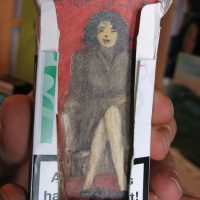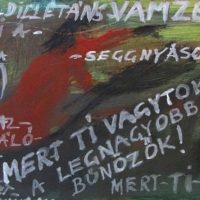Omara’s paintings refer to the violations she has suffered over the years, and the daily discrimination that has followed from her poverty and minority status. These humiliating situations she has lived through are not fiction, and her impotent rage breaks through in her painting.
She begins to paint from her lack of means, which does not necessarily lead to the idea of an envisaged beautiful picture, but much rather the magical power of evocation. This is why her narration is of existential importance, and her content-centricness here signifies the liberation of enunciation.


